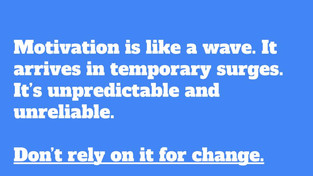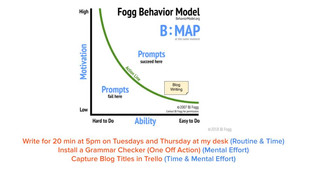
I recently presented at Agile Scotland Conference: Changing Organisational Habits at Scale
Behaviour change is key to organisational change.
About 2 years ago I had a realisation. My knowledge of how behaviour change really happens was limited. This was impacting my ability to be an effective change agent. This talk is a culmination of learning in my personal and professional life. Inspired by big thinkers in this space such as James Clear, BJ Fogg and Gary Keller.
Below is the talk abstract, slides and key ideas.
I'll also be delivering this workshop at Agile Testing Days 2020.
If you'd like to learn more about how to do Habits Coaching you can access my free coach mentoring program

Talk Abstract:
This session will explore the tiny shifts in behaviour that can transform organisational performance at an individual, team and company-wide level. It will focus on small habits to change behaviour.
We often think big changes require big actions. Everything “at scale” is the buzz within many organisations adopting agile across the enterprise. Unfortunately, these big changes at scale often result in failure.
The surprising truth is big changes often come through small, atomic habits, improved consistently over time. In fact, many agile frameworks like Scrum are a collection of small habits adopted together. The Daily Stand up is a great example of an agile daily habit.
However small is not always simple. For a long time when coaching teams I would be frustrated when teams found it difficult to adopt seemingly simple habits.
Through failure and success in my personal life, I’ve now learned that tiny habits, not big changes create breakthrough results. In my work with organisations, I realised that the habit changes I desired were too big. The key was to make new habits as tiny as possible. For example, a 2 minute stand up rather than 15 minutes.
These approaches will be illustrated through several real case studies at organisations, demonstrating how tiny changes can help you change the culture in your organisation.
Changing Organisational Habits at Scale - Slides:
Key ideas within the talk:
Our Habits form the person we are. To change our "mindset" we need to change behaviour.
Coaches need to be aware of the key ingredients that make Behaviour to happen
There are 3 ways behaviour change happens:
Have an epiphany
Change the environment
Change behaviour in tiny ways
The most effective way is to build tiny habits
Don't rely on Motivation. It is fickle and unreliable.
To make behaviour easier focus on these 5 areas:
Money
Time
Physical Effort
Mental Effort
Routine
It's important to think about the "agile" behaviours we want teams to adopt - How can we make them easier?
Management plays a key role in making behaviours easier to adopt. Unfortunately, it's common for management to make behaviour harder to do
Finally follow the 7 steps in behaviour design:
Clarify the desired outcome
Brainstorm behaviour options
Find golden behaviours (Easy to do & Effective)
Start tiny
Find a good prompt
Celebrate successes
Troubleshoot, Iterate & Expand
More Reading:





































